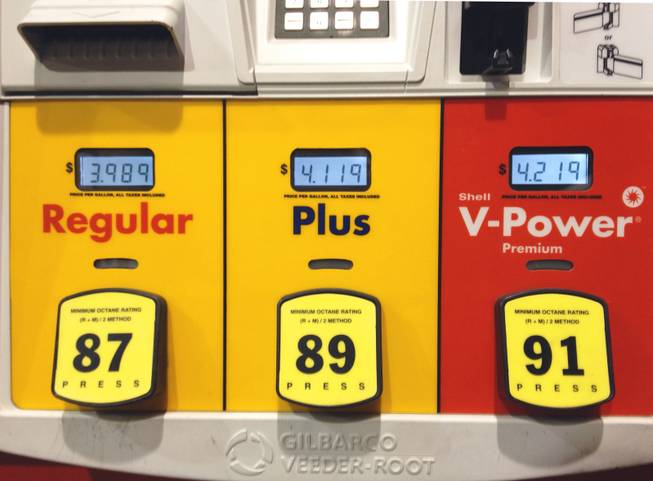
The gas prices at a Shell gas station on East Cactus Drive off of St. Rose Parkway in the southern Las Vegas Valley on Tuesday, March 20, 2012.
Wednesday, March 20, 2013 | 7:25 p.m.
Clark County could raise its fuel taxes under a bill proposed Wednesday at the Nevada Legislature.
The bill would give the Clark County Commission the power to tie the county’s 9 cent gasoline tax — a part of the 51.4 cents per gallon federal, state and local gas tax — to a number of different inflation formulas. This would basically make every gallon of gas you buy in Clark County more expensive over time.
(The Regional Transportation Commission of Southern Nevada estimates roughly an extra 3 cents per gallon or a $16 annual increase for consumers. The Department of Motor Vehicles said Clark County motorists used 740.6 million gallons of gasoline this past fiscal year.)
Using this past year’s numbers, that extra 3-cent tax would have brought the county an extra $22.2 million.
Advocates for the taxing authority and the potential tax increase say this money would help complete road projects.
“The discussion is important to have when we talk about filling our infrastructure needs,” said Assembly Speaker Marilyn Kirkpatrick, D-North Las Vegas, who is shepherding the issue into an Assembly Taxation Committee meeting Thursday.
In general, revenues from fuel taxes don’t buy what they used to because inflation has reduced the purchasing power of fixed cent-per-gallon fuel taxes. The proliferation of hybrid, electric and fuel efficient cars has also meant that governments nationwide may not collect as much in fuel taxes as in the past. That’s good for consumers, but bad for the state of roads and bridges, which the state repairs with fuel tax dollars.
“Transportation dollars as a whole are in trouble,” Kirkpatrick said. “The funding mechanism doesn’t work so well because a lot of people are going to different modes of transportation that don’t pay fuel tax.”
Washoe County got the same permission from the Legislature in 2009 and has been collecting taxes above the 9-cent cap on gasoline taxes due to its inflation-adjusted tax. That county’s index tax raised gas prices last year about 1.5 cents above what they otherwise would have been absent the tax, according to the Department of Motor Vehicles.
Following passage of two bills in 2003 and 2005 and the revision of another bill in 2009, every county except Clark County can use the index tax.
The Clark County bill would put the actual taxing decision in the hands of the Clark County Commission. They would choose from an array of taxes the Legislature authorizes under the bill, and the Regional Transportation Commission of Southern Nevada would annually review the taxes.
The RTC would also benefit from the bill; it has collected about $65 million from the county’s motor vehicle fuel tax during each of the past two years, according to the organization’s financial statements.
“In order to respond to Southern Nevada’s transportation needs, we need to start having discussions about how to generate additional funding to build, improve and enhance our infrastructure and create a transportation vision for our community,” said Tina Quigley, general manager of the Regional Transportation Commission of Southern Nevada. “The bill today will allows us to have those conversations in Southern Nevada.”
Quigley said the tax collections from the indexed tax wouldn’t be spent right away.
Instead, they could be used to get $808 million in bonding capacity during the first three years of index taxes.
Those projects could create approximately 11,000 jobs to fund projects like Interstate 11 and the Boulder City Bypass, Quigley said.

Join the Discussion:
Check this out for a full explanation of our conversion to the LiveFyre commenting system and instructions on how to sign up for an account.
Full comments policy